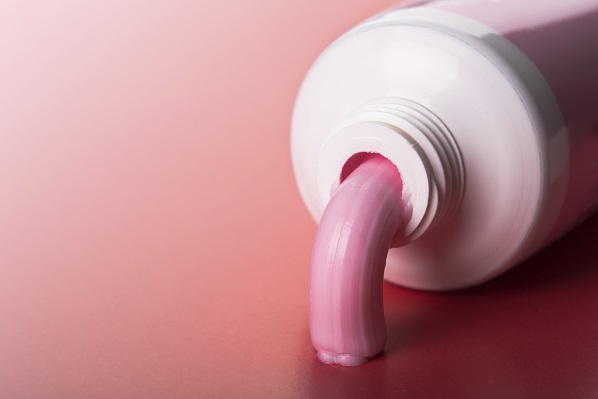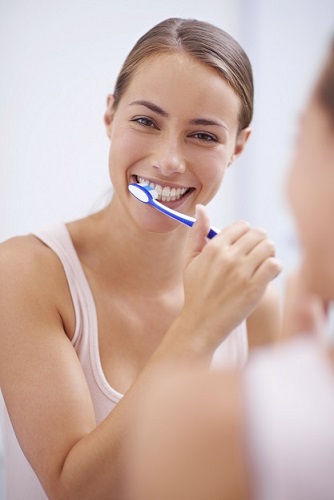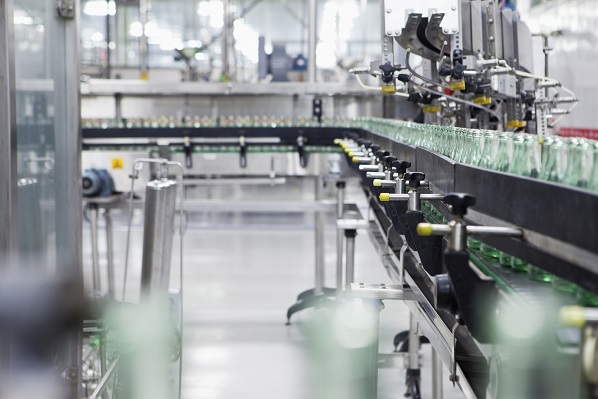 Topical toothpaste is the most notorious acne home remedy of all. The rumour goes like this: you apply a small blob of toothpaste to a particularly aggressive pimple, and then go to sleep.
Topical toothpaste is the most notorious acne home remedy of all. The rumour goes like this: you apply a small blob of toothpaste to a particularly aggressive pimple, and then go to sleep.
When you wake up the toothpaste will have dried out, and your pimple will have dried out alongside it. On top of that it will also be less red, less big, and its death will have been greatly accelerated.
The whole recommendation is that toothpaste is a great emergency tool to use if you are going on a date, going to a ball, or doing anything else that requires attractive skin…
…so therefore I had to find out whether there’s even an ounce of truth to it. However the truth of the matter is extremely hard to come by; the problem is that toothpaste is such a massively complicated substance with tons of different chemicals.
First you have the chemicals designed to clean your teeth, like the notorious fluoride. Then you have a ton of other teeth whitening chemicals, stabilisers, and finally foaming agents like sodium lauryl sulfate. The ingredients vary a ton too, so establishing a very clear rule for all toothpastes is impossible.
Nevertheless I firmly do NOT recommend that you use toothpaste as a topical treatment for your acne, and there are two key reasons for that.
The evidence for toothpaste is thin
The first of those reasons is that there’s very little evidence that any toothpaste could be effective for your pimples, while at the same time, there is a ton of evidence to suggest that toothpaste’s chemicals can make acne worse.
Make no mistake, some people have had good experiences with topical toothpaste. That’s how the whole rumour got started in the first place. At least one of the countless compounds in commercial toothpastes has some acne reducing ability, and I believe it is the one called triclosan.
Triclosan is a chemical used in a ton of different everyday products, and it’s very useful for toothpaste because it is antibacterial. The main star of the teeth cleaning show is fluoride, but by killing harmful bacteria in the mouth, triclosan compliments its effects nicely…
…and what that also means is that applying toothpaste to your acne can kill the p. acnes bacteria inside it. Studies have shown this repeatedly; this one found that while triclosan is not effective against every type of bacteria, it is highly effective at wiping out Propionibacterium acnes.
Read Annihilate Your Acne – get the greatest diet ever for clear and radiant skin
Therefore the benefits that the original toothpaste user may have noticed could be due to triclosan killing this bacteria and thus reducing the need for the immune system to attack the pimple. Less inflammatory chemicals would be inflaming the pore, causing it to “calm down” and be less irritated.
However this doesn’t mean that toothpaste can reduce acne overall, because plenty of the other chemicals in toothpaste can cancel out those benefits. Sodium lauryl sulfate is a manmade chemical in toothpaste that is designed to create the classic foaming effect that toothpastes produce. Its foaming capabilities make it extremely useful for a variety of products, including your shampoo, your shower body wash, shaving foam and many more.
It is safe to say that these foaming powers are what sodium lauryl sulfate is best known for. However, the second best thing that SLS is known for is being a potent skin irritant. Sometimes scientists are conducting a study where they need to irritate somebody’s skin at first, maybe to test the effects of a new skin soothing product…
…and the chemical they almost always use to get this effect is sodium lauryl sulfate. Such a powerful and reliable irritant is not something you want to get anywhere near your acne! Placing a toothpaste with SLS on a pimple will counteract all the “beneficial” (triclosan is far from a healthy substance overall) effects of triclosan.
Not only is sodium lauryl sulfate notorious for damaging your skin, but several of toothpaste’s other chemicals also have the same power. Fluoride is notoriously inflammatory, titanium dioxide was linked to inflammation in this study, and there are countless other chemicals that are on the medical equivalent of probation.
The factor that puts the final nail in the toothpaste coffin is that many toothpastes nowadays don’t even have triclosan in them. It has turned out in recent years that triclosan is a highly dangerous chemical. This study found that triclosan reduced heart function by 25%, this one found that triclosan reduced circulating levels of the T4 thyroid hormone in rats.
Numerous studies have found that Triclosan has a highly disruptive effect on hormones and can mimic estrogen in the human body. Basically, Triclosan is now a public enemy and because it’s good for sales, many toothpaste companies are now removing it from their products.
The 7 greatest topical treatments for naturally clear skin
That means that the very compound which is likely (though not certain) to be the one that helped the first topical toothpaste user all those years ago, is no longer found in most toothpastes anyway. Some toothpastes still contain triclosan, but basically, the only possible hope of a toothpaste benefit has now faded away.
Toothpaste contains inflammatory chemicals
 The second big reason against using toothpaste topically is that most of toothpaste’s many chemicals are not substances you want inside your body. Consider the triclosan we just discussed. Triclosan is an estrogen mimic, meaning that it can contribute to estrogen dominance and thus raise DHT. DHT is the androgen that is the biggest cause of high sebum production, particularly in women.
The second big reason against using toothpaste topically is that most of toothpaste’s many chemicals are not substances you want inside your body. Consider the triclosan we just discussed. Triclosan is an estrogen mimic, meaning that it can contribute to estrogen dominance and thus raise DHT. DHT is the androgen that is the biggest cause of high sebum production, particularly in women.
You don’t want triclosan’s inflammatory powers to be roaming around your bloodstream either, and you certainly don’t sodium lauryl sulfate to enter your body. And those two chemicals are merely the tip of the iceberg. The worst thing is that many of these chemicals persist in the body, meaning that triclosan could be messing with your acne hormones for a very long time.
You might breathe a sigh of relief after you read that; after all it’s not like you’re eating the toothpaste. However, the reality of the situation is that the chemicals in the toothpaste can get into your body anyway. Human skin is like a giant sponge because it absorbs any compound it comes into contact with; that’s why you always see topical supplements on the market, like magnesium oil, zinc oil, and testosterone cream.
We do have natural barriers to defend against bacteria, viruses, and natural threats, but our skin is not designed to keep out modern industrial chemicals and their endlessly complex formulas.
Therefore your skin will easily absorb a good chunk of the toothpaste chemicals you apply to it. The most toxic aspect of the process is that the chemicals can enter your bloodstream directly. If, for example, you swallow the chemicals in toothpaste while you are brushing your teeth, then that is still bad…
…however it does give the enzymes in your saliva and stomach a chance to break them down partially. Meanwhile, when you absorb them into your bloodstream the chemicals are not filtered at all, and they are free to wreck the full extent of their inflammatory havoc on your body.
It should be pretty clear by now that you should not bother with using toothpaste topically. There is a small chance that it might improve your skin, but that’s only if you happen to stumble upon one with the perfect ingredients. In other words, the chance is tiny.
Next: the 6 vitamins and minerals which can massively reduce acne
What probably will happen is that you wake up in the morning and find that your pimple has not decreased in size but has rather become a lot more painful and red. Added inflammation from outside forces can dramatically increase the time it takes a pimple to heal, so that’s yet another reason why toothpaste is a terrible treatment.
Raw honey, on the other hand, is a fantastic topical treatment. The final reason why I recommend that you don’t use toothpaste is that there’s simply no point, not when there are so many natural and more effective alternatives. Raw honey’s very real effects are quite similar to the legendary ones of toothpaste; it can lessen the inflammation of a pimple, dry it out, and make it less inflamed.
Raw honey has incredibly strong antibacterial properties, a quality which it is well known for among scientists. Unlike toothpaste, all this comes without any compounds that can wreck your skin. I wrote a whole article about raw honey here, but for now I’ll say that it is a truly great topical treatment. Grapeseed oil and sea buckthorn oil are as well. All three are certainly a lot better than toothpaste, which only ever irritated my acne.
Conclusion
 The likely explanation is that the “toothpaste cures acne” theory began when some random woman, many decades ago, was simply out of options and decided to try toothpaste. She was almost certainly lucky enough to have a good-quality toothpaste where the balance of chemicals was actually beneficial for acne, and did indeed notice benefits.
The likely explanation is that the “toothpaste cures acne” theory began when some random woman, many decades ago, was simply out of options and decided to try toothpaste. She was almost certainly lucky enough to have a good-quality toothpaste where the balance of chemicals was actually beneficial for acne, and did indeed notice benefits.
Then she would have passed the knowledge on to her teenage children, and from that day forth the legend would have become part of history forever…
Regardless of how it started though, there’s little doubt that as a topical treatment, toothpaste is a joke. It’s as much as a joke as two other classic home remedies, lemon juice and baking soda.
On top of that, I don’t even recommend that you brush your teeth with regular toothpaste. The inflammatory chemicals can enter your body both by you accidently swallowing them, and also through the membranes in your mouth.
The good news is that you won’t have to spend the rest of your life simply gumming away at your food without much success. In this article I detailed how baking soda mixed with organic coconut oil makes for an excellent teeth cleaning method.
It is simple, yet it still manages to be vastly superior to any high-end toothpaste with a ton of chemicals in it. It’s the recipe I use twice a day, and I am certain that my teeth are getting gradually whiter as a result of it. The best part is that it’s ridiculously cheap too.
Therefore my final words are: don’t bother with toothpaste, use a decent topical treatment like sea salt or grapeseed oil instead, and don’t forget to eat a healthy diet that’s packed with acne busting foods.
NEXT: the ultimate diet for clearing acne permanently
Thanks for reading!